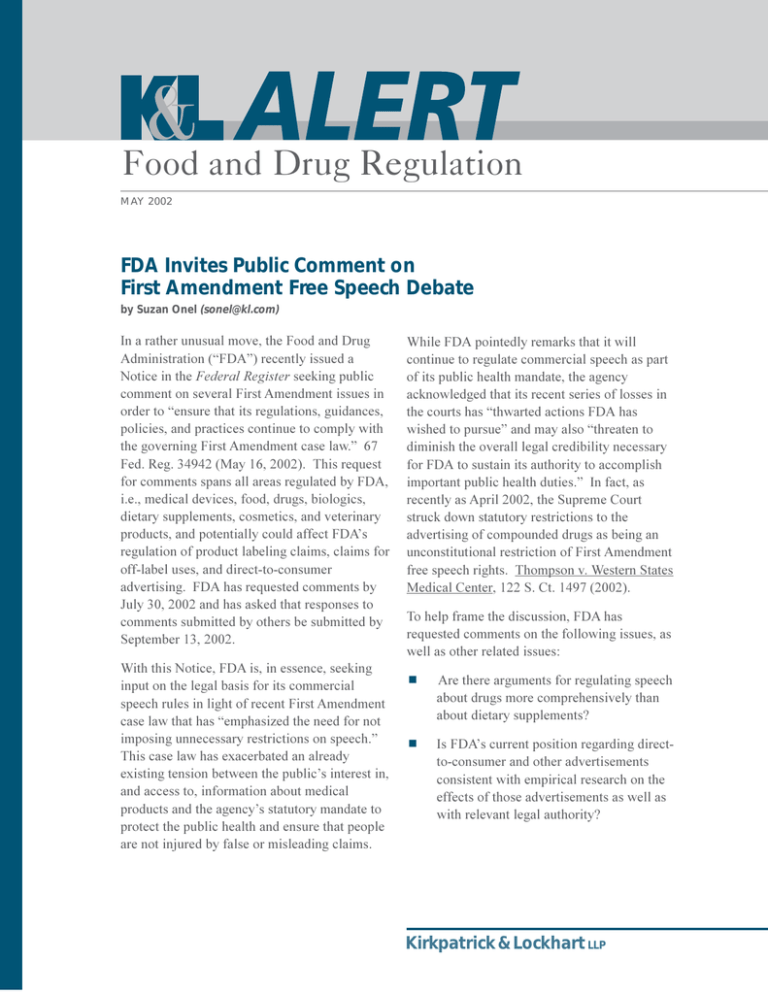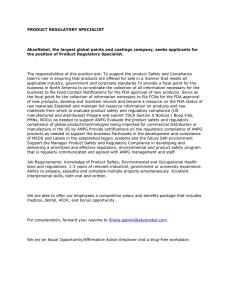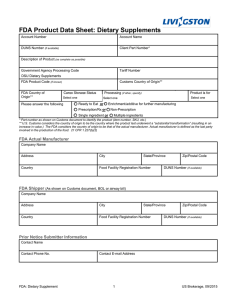
Food and Drug Regulation
MAY 2002
FDA Invites Public Comment on
First Amendment Free Speech Debate
by Suzan Onel (sonel@kl.com)
In a rather unusual move, the Food and Drug
Administration (FDA) recently issued a
Notice in the Federal Register seeking public
comment on several First Amendment issues in
order to ensure that its regulations, guidances,
policies, and practices continue to comply with
the governing First Amendment case law. 67
Fed. Reg. 34942 (May 16, 2002). This request
for comments spans all areas regulated by FDA,
i.e., medical devices, food, drugs, biologics,
dietary supplements, cosmetics, and veterinary
products, and potentially could affect FDAs
regulation of product labeling claims, claims for
off-label uses, and direct-to-consumer
advertising. FDA has requested comments by
July 30, 2002 and has asked that responses to
comments submitted by others be submitted by
September 13, 2002.
With this Notice, FDA is, in essence, seeking
input on the legal basis for its commercial
speech rules in light of recent First Amendment
case law that has emphasized the need for not
imposing unnecessary restrictions on speech.
This case law has exacerbated an already
existing tension between the publics interest in,
and access to, information about medical
products and the agencys statutory mandate to
protect the public health and ensure that people
are not injured by false or misleading claims.
While FDA pointedly remarks that it will
continue to regulate commercial speech as part
of its public health mandate, the agency
acknowledged that its recent series of losses in
the courts has thwarted actions FDA has
wished to pursue and may also threaten to
diminish the overall legal credibility necessary
for FDA to sustain its authority to accomplish
important public health duties. In fact, as
recently as April 2002, the Supreme Court
struck down statutory restrictions to the
advertising of compounded drugs as being an
unconstitutional restriction of First Amendment
free speech rights. Thompson v. Western States
Medical Center, 122 S. Ct. 1497 (2002).
To help frame the discussion, FDA has
requested comments on the following issues, as
well as other related issues:
¾
Are there arguments for regulating speech
about drugs more comprehensively than
about dietary supplements?
¾
Is FDAs current position regarding directto-consumer and other advertisements
consistent with empirical research on the
effects of those advertisements as well as
with relevant legal authority?
Kirkpatrick & Lockhart LLP
¾
May FDA distinguish claims concerning
conventional foods from those relating to
dietary supplements? To what extent do
assertions in claims need qualifications or
disclaimers added to the label to avoid any
misconceptions that consumers may draw?
¾
How can warnings be made most effective
in preventing harm while minimizing
chances of consumer confusion or
inattention?
¾
What arguments can be made, if any, to
support distinguishing between claims
made in labels and those in
advertisements?
¾
Would permitting speech by manufacturers
and distributors concerning off-label uses
undermine the statutes requirement that
new uses be approved by FDA?
¾
Are there any regulations, guidance,
policies, and practices FDA should change
in light of governing First Amendment
authority?
It is not surprising to note that new FDA Chief
Counsel Daniel Troy has a particularly keen
interest in First Amendment issues as a former
administrative trial lawyer in private practice.
As a result, this Notice and request for
comments, while novel, may offer industry a
real opportunity to help mold agency decisions
and policy. If you are interested in more
information about recent case law, FDAs
position on current First Amendment issues, or
submitting comments to this Notice, please let
us know.
*
*
*
*
*
If you have questions about this Alert, please contact the
author or any member of the Food & Drug Practice.
Kirkpatrick & Lockharts Food & Drug Practice offers comprehensive legal and regulatory counseling to
companies and other organizations regulated by FDA under the Federal Food, Drug, and Cosmetic Act. The
Food & Drug Practice represents manufacturers and distributors of food, dietary supplement, pharmaceutical,
medical device, personal care and cosmetic products, and products of biotechnology, as well as trade associations,
individuals and institutions involved in clinical research of FDA-regulated products.
PARTNERS
Suzan Onel
Donald R. Stone
Gary L. Yingling
202.778.9134 sonel@kl.com
202.778.9067 dstone@kl.com
202.778.9124 gyingling@kl.com
ASSOCIATES
Ann M. Begley
Rebecca L. Dandeker
Jodi Finder
Michael H. Hinckle
OF COUNSEL
Emalee G. Murphy
202.778.9428 emalee.murphy@kl.com
202.778.9365
202.778.9409
202.778.9044
202.778.9296
abegley@kl.com
rdandeker@kl.com
jfinder@kl.com
mhinckle@kl.com
®
Kirkpatrick & Lockhart LLP
Challenge us.
®
www.kl.com
BOSTON
n
DALLAS
n
HARRISBURG
n
LOS ANGELES
n
MIAMI
n
NEWARK
n
NEW YORK
n
PITTSBURGH
n
SAN FRANCISCO
n
WASHINGTON
.........................................................................................................................................................
This publication/newsletter is for informational purposes and does not contain or convey legal advice. The information herein
should not be used or relied upon in regard to any particular facts or circumstances without first consulting a lawyer.
© 2002 KIRKPATRICK & LOCKHART LLP.
ALL RIGHTS RESERVED.





